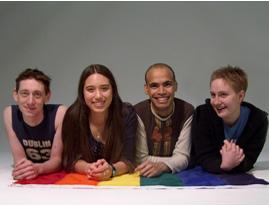The Alberta Civil Liberties Research Centre wants to talk to every youth service provider in Alberta about what it’s like to be queer. For three years, the human rights organization has been providing its workshop, Youthsafe, across the province, and it has recently announced another year of anti-homophobic programming.
Youthsafe facilitator Melissa Luhtanen says the one-day workshop teaches participants about the problems of homophobic bullying and harassment and the increased risks that some queer youth face, such as suicide and drug abuse.
“We connect these service providers to the resources in the community that are out there but that people don’t know about,” she says.
Workshop participants come from diverse professional backgrounds including, school councillors, social workers, police officers, psychologists and anyone who may encounter families or youth in their profession. In the morning, workshop participants learn about the different parts of the queer population and the particular challenges queer youth face. By the afternoon, participants are learning how to develop responses to address bullying and harassment, as well as what their organization’s legal responsibilities are.
“Many organizations do not realize that they can get called to the Alberta Human Rights Commission if they are not addressing these issues sufficiently,” says Luhtanen.
Last year, Youthsafe trained about 200 people and received considerable positive feedback. Interestingly there is a growing demand for the workshop in rural Alberta, and program facilitators are aggressively pursuing these rural links.
“Normally we need about 20 people to do a workshop, but we will go out for fewer people, to meet the needs of a rural community,” says Luhtanen. “Often it is in Alberta’s rural communities where homophobia is greatest, and where this information is most needed.”
One of Youthsafe’s strengths is that it connects workshop participants to the queer community resources that are already present in Alberta. When developing the program, the facilitators were conscious of not trying to recreate existing programming but fill the awareness gap. Participants leave the workshop with take-home reading material to explore queer youth issues further as well as contact phone numbers for support when questions arise.
“I feel like we are doing really good work here,” says Luhtanen. “But I am encouraged by the fact that our province’s social workers have good working models for helping people already.” She says they just need a few pointers about the specific needs of the queer youth.

 Why you can trust Xtra
Why you can trust Xtra


